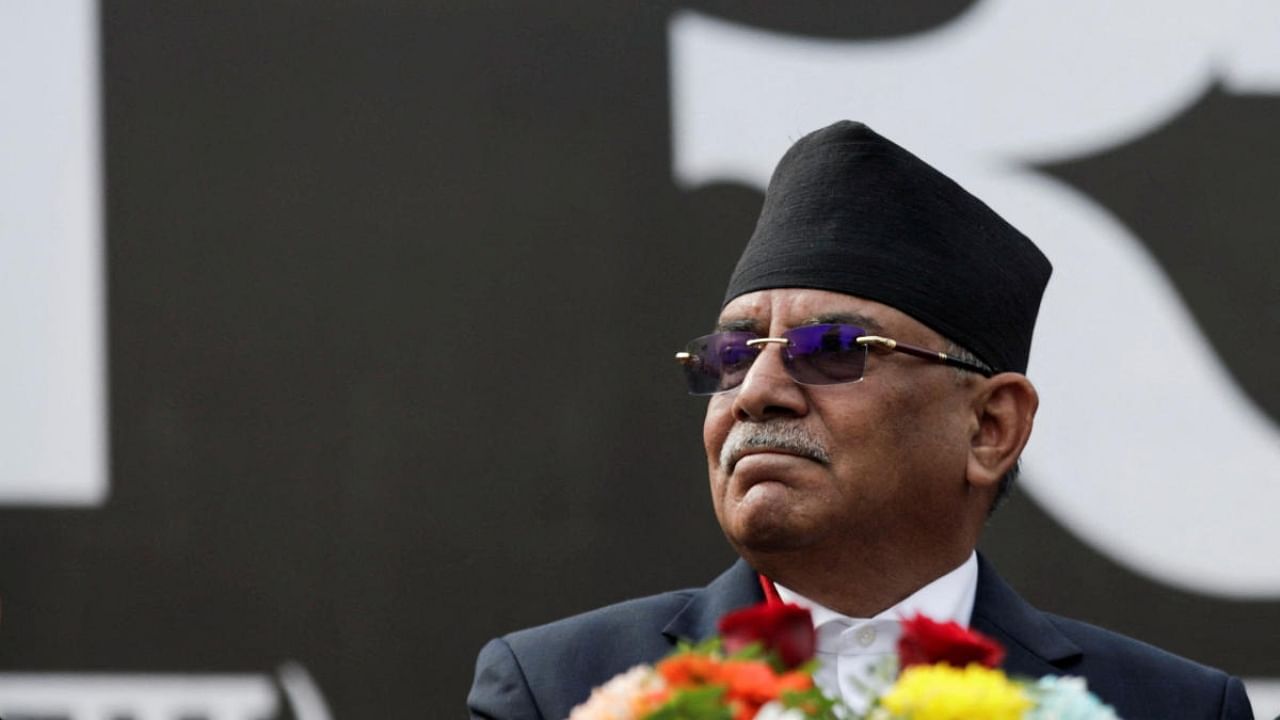
Nepal's new Prime Minister Pushpa Kamal Dahal 'Prachanda' isn't perhaps the only one rubbing his hands in glee after having checkmated erstwhile coalition partner Sher Bahadur Deuba to grab the PM's post. China, too would be decidedly pleased, with the Communists having joined hands to snatch the chair from the Deuba-led Nepali Congress, widely perceived as being pro-India.
With Nepal's November parliamentary polls delivering a hung Parliament, it left the room wide open for political machinations and eventually saw Dahal pipping Deuba to the PM's post by switching allegiance to join the alliance led by former PM and arch-foe K P Sharma Oli.
Also Read: India, China look to reach out to Prachanda
Shortly after taking charge, the Dahal-led CPN (Maoist Centre) said it will "maintain relationships of equi-proximity with both our neighbours", India and China. Going by past experience, New Delhi is well aware that Nepalese leaders across the political spectrum, and not just the Communists, have shown a willingness to tango with Beijing in order to fulfil their political ambitions.
Even so, the installation of a Nepali Congress-led government in Kathmandu, which has traditionally been seen as being in sync with New Delhi's strategic imperatives, had held the promise of stable bilateral relations.
It's noteworthy that New Delhi-Kathmandu ties only normalised in the last year-and-a-half, after Deuba took charge as PM, succeeding Oli, who had given New Delhi a rather rough time while playing to the gallery with his anti-India rhetoric.
However, now that the Communists are in power, New Delhi is left with little choice but to make the best of a difficult situation, especially one where it is struggling to retain its strategic space amidst China's relentless and deepening inroads into the Himalayan nation.
India will also need to keep a close eye on the geo-strategic rivalry between the US and China playing out in Nepal. The US has significantly stepped up its engagement with Kathmandu in the last couple of years, finally even managing to get Nepal on board the $500 million Millennium Challenge Corporation (MCC), seen as a counter to China's Belt and Road Initiative (BRI).
New Delhi will have to continue to remain engaged with parties and leaders of all hues and shades. This is imperative not only because of the extremely fluid nature of Nepal's politics, but also because India no longer enjoys the pole position that it once did in Kathmandu, with China having gained increasing salience in the country's political landscape.
For New Delhi, Dahal's crowning as the new PM would have undoubtedly come as a rude shock, as it would have for Deuba. Unhappy with Deuba's unwillingness to hand him the reins of government for the first two-and-a-half years of what was to be rotational power-sharing of the PM's post, Dahal did not hesitate to cross over to the Oli-led coalition. The very coalition he had dumped last year after being denied the prime ministership by Oli.
Winning just 30 seats and his party emerging third in the votes tally, Dahal's embrace of Oli once again highlights the fickleness of Nepal's politicians. In the world of Nepal's politics, overweening ambition bereft of any ideological moorings now rules and gaining power at any cost is the ultimate objective for its leaders.
And Dahal is one such example of this lust for power, switching alliances with effortless ease. Once a Maoist rebel who led an insurgency to oust the monarchy, he has lost his aura in the years since he joined mainstream politics in 2006.
Little distinguishes him from the opportunism exhibited by other Nepalese leaders, as ideology has given way to political expediency. So Dahal had little qualms in joining an alliance led not only by an adversary but one of whose constituents was the pro-monarchy Rastriya Prajatantra Party (RPP) that got 14 seats.
With New Delhi and Dahal having had a fraught relationship marked by a lack of mutual trust, and yet mutual need from the time he was leading the Maoist insurgency, the two sides will have to find a way to do business and ensure relations remain on an even keel.
New Delhi did reach out to Dahal just months ahead of Nepal's elections when he was extended an invitation to visit India by BJP president J P Nadda. Dahal met National Security Adviser Ajit Doval, external affairs minister S Jaishankar and foreign secretary Vinay Mohan Kwatra.
But there was no meeting with PM Narendra Modi even though Dahal was hoping for one. While Dahal may have returned disappointed, New Delhi knew a meeting with Modi would send the wrong message in Nepal – of trying to throw its weight behind a particular political outfit.
Dahal, though, isn't the only cause for New Delhi's worries. New Delhi will also have to watch out for Oli, who scuttled Deuba's game plan despite his party having won 89 seats, the maximum by any party. With 72 seats, Oli has emerged as the kingmaker, and has made no secret of his leaning towards China.
Not one to be content sitting quietly on the sidelines till his turn to become PM comes two-and-a-half years from now, Oli will undoubtedly roil the firmament for his own political gain in the days to come.
While Dahal, for now, will be able to prove his majority in Parliament, which has to be done within 30 days of his swearing-in, political stability in Nepal, in the long run, is unlikely. India has no option but to up its game in Nepal.
(The writer is a senior Delhi-based journalist)
Disclaimer: The views expressed above are the author's own. They do not necessarily reflect the views of DH.